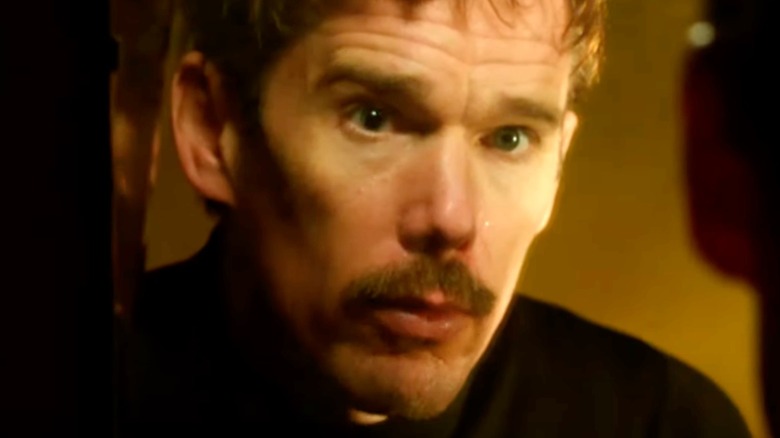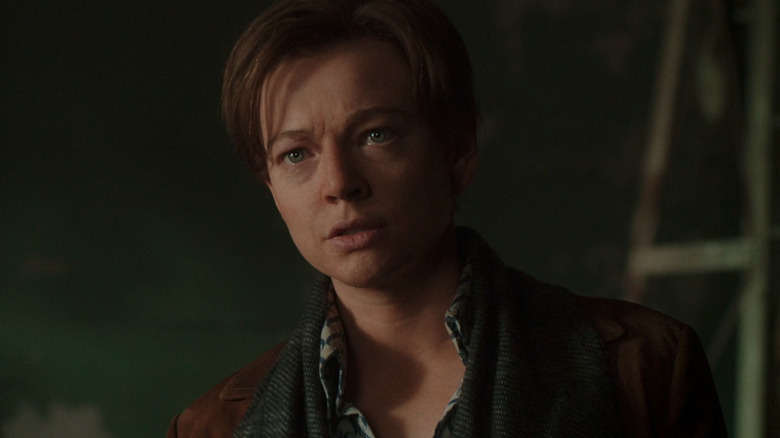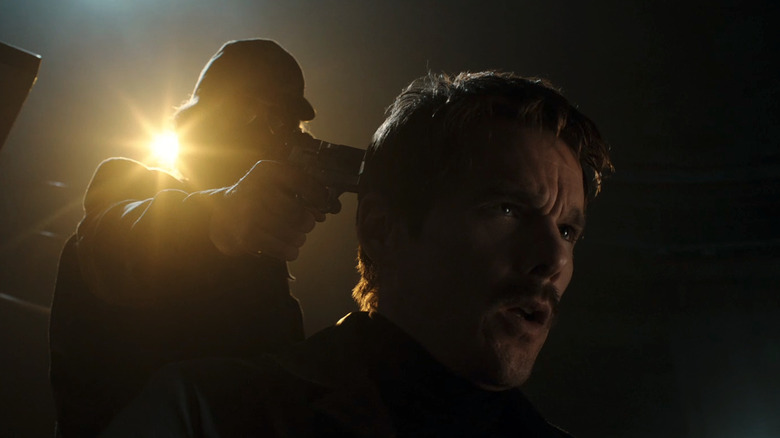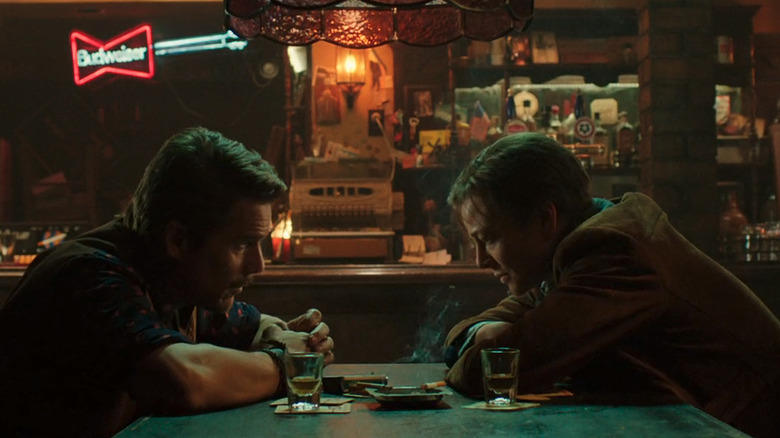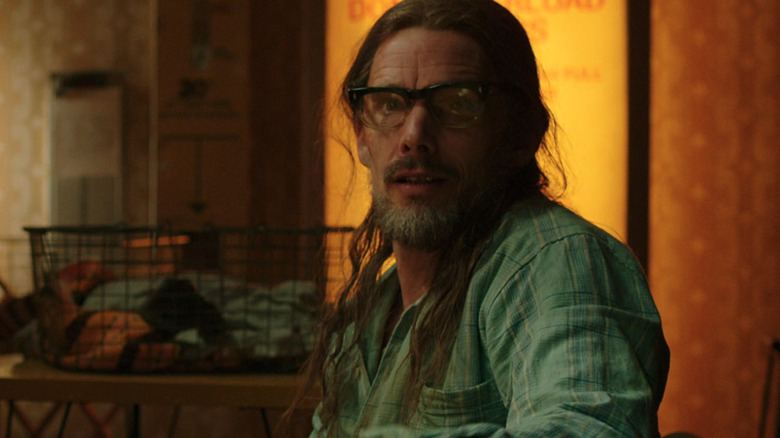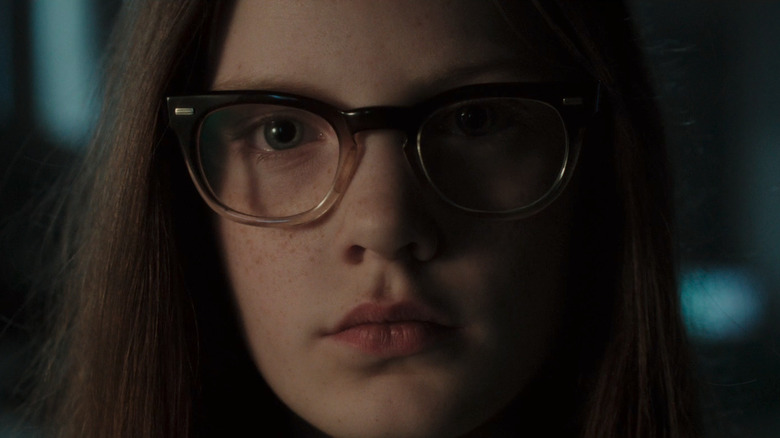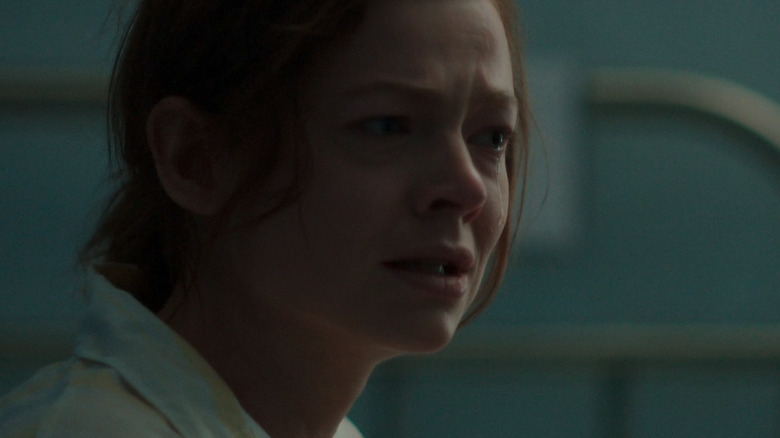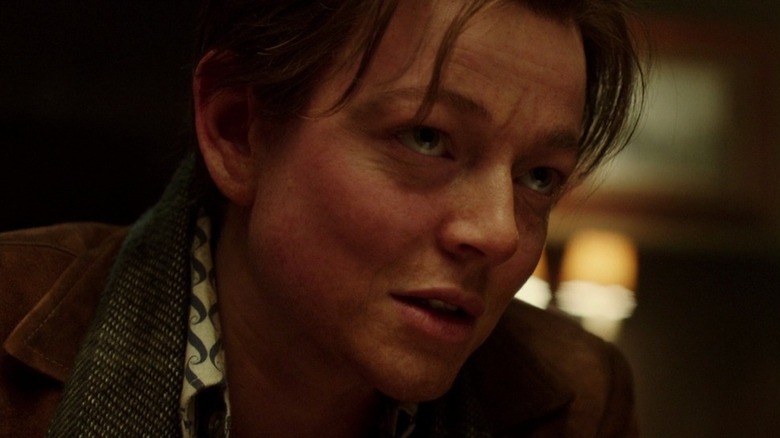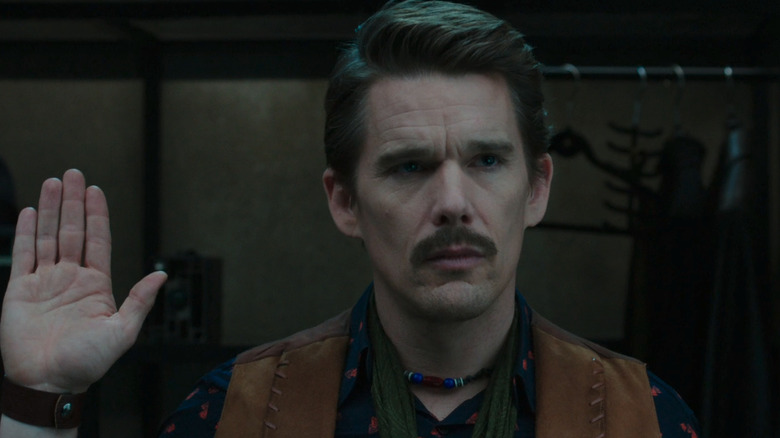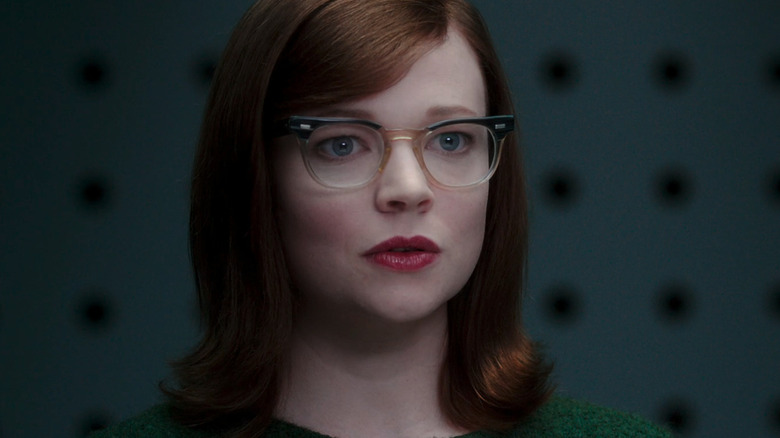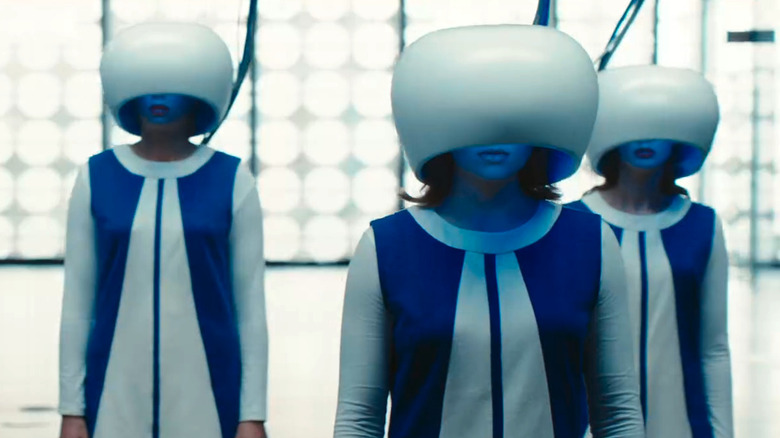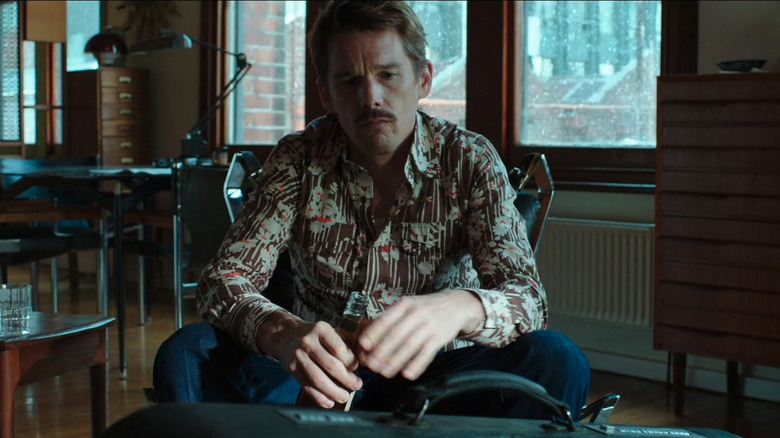The Ending Of Predestination Explained
What could be one of the most under-appreciated science fiction movies of the 2010s — mostly because it went largely unseen at the time — the time travel drama "Predestination" has one of the most complex stories in the genre. Starring Ethan Hawke ("Moon Knight") and Sarah Snook ("Steve Jobs"), it tells the story of a time traveling investigator on the hunt for a deadly bomber who has been terrorizing the past. But while tracking him down, the agent meets a mysterious stranger, a man who tells him his astonishing life story, which hits far closer to home than anyone could expect.
By the end of the tale, viewers will either be left with their jaws on the floor in sheer disbelief, or scratching their heads in confusion. The film's narrative weaves through different time periods, with multiple characters at different parts of their lives. It also explores meaningful themes that might not be so readily apparent on a first watch, but if understood could leave you with something more to ponder than a mere sci-fi romp.
If you're one of those who was left a little confused, we're here to clear things up. We'll explain the plot, run through the story's convoluted timeline, and examine the many themes and messages the filmmakers explore. Or even if you ever just wondered how deep the rabbit hole goes in this underrated sci-fi gem, then keep reading — this is the ending of "Predestination" explained.
Note: The following article includes frank discussion of child abuse and violence against queer, transgender, and intersex persons.
An adventure through time
In the film's opening we meet two shadowy figures — one a deranged bomber, the other his time-traveling pursuer. In a violent confrontation, the time cop's body is mutilated by flames, and when he's returned to his own time, surgeons warn him that his face will never be the same. With that, we meet Ethan Hawke's character, who we will call The Bartender. Because after he heals, we meet him next tending bar in 1970s New York, where he has time traveled in search of the notorious Fizzle Bomber. There he meets a young writer of women's confessional stories, who we will call by their pen name, The Unmarried Mother.
The Unmarried Mother tells The Bartender their life story, beginning with their birth as Jane, left as a baby on the steps of an orphanage. A brilliant mind, Jane was always an outcast, enduring hardships all throughout youth. As an adult, Jane was recruited by a government stooge named Robertson to join an elite space program. But after being disqualified, Jane falls in love with a mysterious man who vanishes, leaving Jane pregnant with their child.
After giving birth, doctors made the discovery that Jane was actually intersex, and forced a gender reassignment surgery without consent. Jane now lives as The Unmarried Mother we met in the bar. But to make matters worse, the baby was abducted shortly after birth, and Jane blames their mysterious former lover for destroying their life.
The Unmarried Mother's revenge
With the background out of the way, let's begin to unfurl the confusing conclusion. After hearing The Unmarried Mother's remarkable life story, The Bartender makes an offer: he knows the man who ruined Janes life, and can offer the chance for revenge. The Bartender reveals that he's a time traveling agent who has tracked The Fizzle Bomber to a point in the past, and he believes that this villain is the same man from The Unmarried Mother's story. Handing The Unmarried Mother a gun, The Bartender uses what appears to be an old violin case to travel back in time to the 1960s, where he claims they will find The Fizzle Bomber and stop his rampage, and The Unmarried Mother can get payback at the same time.
But while standing in a college courtyard waiting for The Fizzle Bomber, The Unmarried Mother is confronted by their younger self, Jane. It's then that they — and we — realize that The Unmarried Mother is the actually mysterious man who Jane fell in love with. Some of the dominoes begin to fall now as we understand the shocking truth: that Jane is their own husband and lover. The two fall in love all over again, with the older Unmarried Mother leaving their younger self pregnant.
But does this mean that The Unmarried Mother is also The Fizzle Bomber, as The Bartender suggested? Just wait, because it gets even more confusing than that.
The Truth Revealed
While The Unmarried Mother is off meeting their younger self Jane, The Bartender travels back again, this time to 1964, where he dons a coat and hat and goes to a local hospital where it just so happens that the younger Jane is giving birth. The Bartender was the man responsible for stealing Jane's bab, and he's about send the little tyke back in time to an orphanage in 1945, meaning that not only is Jane the Unmarried mother, but they're also their own mother and father. But there are still more secrets to be uncovered — The Bartender's time traveling supervisor, a man named Robertson, is the same man who had attempted to recruit Jane in the '60s for a top secret government program.
Robertson then warns The Bartender that the jumps he's been making through time have been illegal, and could lead to serious psychosis. The Bartender, though, seems to be well aware, and he's recruiting Jane — now The Unmarried Mother — to be his replacement. But the next twist comes when Robertson reveals the truth that The Bartender already knows: he too is Jane, a future version of The Unmarried Mother.
Robertson says this is why the Bartender has always made a good agent: he's a man with no past and no future, his existence a predestination paradox. It's even hinted that Robertson himself may have somehow engineered his creation. But what about the bomber? Well, there's one more piece to this colorful jigsaw puzzle.
The Timeline Explained
The timeline of "Predestination" is more than just a straight line or even a loop — it's a pretzel of mind-bending illusiveness, and you'll have to pay careful attention to keep it straight.
Jane is born in 1964, kidnapped by The Bartender as a newborn and taken back in time and delivered to an orphanage in 1945. There, baby Jane endures a troubled childhood as an outcast and pariah, eventually attempting to enlist in an elite government space program. After being disqualified, Jane meets a mysterious man and gets pregnant. After the birth, doctors forcibly transition Jane's sex, and Jane takes the new name John, becoming a writer with the alias of The Unmarried Mother. Years later, John meets The Bartender, who sends John back in time to 1963, where John and Jane fall in love and conceive a child.
After abandoning Jane, John then becomes a time travel agent, and is eventually burned in a confrontation with the bomber. John goes on to become The Bartender and meet The Unmarried Mother, whom The Bartender sends back in time to 1963. John the Bartender then steals his own baby and delivers it to 1945 to be raised in the orphanage. But when all is said and done, John the Bartender finally finds The Fizzle Bomber, and discovers the final piece to the puzzle: he is also The Fizzle Bomber, driven mad by time travel psychosis.
But the mere timeline doesn't begin to describe just what "Predestination" is really all about.
It's about letting go of the past
It's easy to think that a science fiction movie like "Predestination" would use time travel as little more than a device to shock the audience with clever twists and stunning revelations in a fast-paced, dramatic adventure like "Back to the Future" or "The Terminator." But directors Peter Spierig and Michael Spierig have done more than just craft an entertaining story — they've used sci-fi tropes to explore some serious themes. Jane's story, from troubled childhood to life as a time-traveling detective, examines how the past shapes who we are.
A central theme of the film, letting go of the past and moving beyond regret, can be seen throughout. Though the repeated mentions of inevitability can be seen as clever winks at the time travel paradox, they can also be seen through another lens: that the past is immutable, and to grow we must accept what cannot be changed and move beyond it. This is echoed in the final scenes, when John the Bartender confronts his future self, The Fizzle Bomber. The bomber tells him that in his past, when he was The Bartender, he killed his older self the bomber, which is what led him to become a villain in the first place. Thus, the only way grow into something different – and stop the bomber — is to change the future, and let him live. If he can move beyond his regret, he can change his future.
A treatise on trauma & the cycle of abuse
Moving on from the past is linked to another theme that can be found in the Spierig Brothers' time-hopping adventure "Predestination" — the cycle of trauma that persists in the abused. While outside of science fiction in our very real world, experts in the fields of trauma have spent decades observing the cycles present, where those who suffer in childhood often manifest violent tendencies themselves as adults (via MEL Magazine). Continuing the patterns of trauma and abuse by inflicting it on others, some are seemingly powerless to escape the cycle of violence.
"Predestination" uses science fiction to take this cycle to its furthest and most literal extreme. In the film the young, troubled Jane suffers abuse in youth that in some ways they're directly responsible for, in that their future self delivers them to an orphanage as a baby, knowing a traumatic childhood awaits. Jane's life is a repeating cycle of trauma from beginning to new beginning, never ending, like a snake eating its own tale. That final scene, in which The Bartender confronts his future self The Fizzle Bomber, once again reinforces this theme as well, as he finds himself unable to end the cycle of trauma, instead beginning a new loop.
If you or someone you know may be the victim of child abuse, please contact the Childhelp National Child Abuse Hotline at 1-800-4-A-Child (1-800-422-4453) or contact their live chat services.
It's all about identity
At the heart of "Predestination" are questions that many ponder throughout their lives: "Who am I, and why am I here?" For Jane (and the many different versions of Jane we meet throughout the film), the question is a bit more literal. All Jane's youth, they struggled to understand who they were, feeling out of place amongst other girls, unable to accept the reality that they may not be definable by the masculine and feminine stereotypes of the era. In fact, in a key scene when Jane is being interviewed for recruitment by a government agency, they reveal what sits at the heart of this struggle for identity. "I feel like there's something out of balance," Jane says. "Like I'm living in somebody else's body."
For Jane, it will take a pregnancy and a forced medical procedure before they understand the scientific and medical reasons for their own uniqueness, but decades more to understand their own identity within. Jane will struggle through three different lives — as Jane, as The Unmarried Mother, and as The Bartender — before they truly grasp the nature of their own identity. Rather deftly, the film once again uses science fiction and the paradox of time travel to take the question of the self further than a more grounded film might be able to.
The meaning of choice and the paradox of destiny
Beyond the themes of trauma and letting go, "Predestination" examines a classic philosophical question of whether choice and free will are but an illusion. More than once throughout the film, the subject of inevitability is brought up, and whether some things, some events, are simply unavoidable — destined, even — and impossible to change. For our protagonist, the answer is a fairly straightforward "no," as they remain unable to alter their own past, present, or future.
It's not for lack of trying, either, as at different points — as John the Unmarried Mother confronting younger self Jane for example — our protagonist contemplates, and even tries (to some degree) to change what they know has already happened. But no matter how much they might want to take control of their own fate, they cannot. As The Bartender later in life, it seems that John has become resigned to fate, having long accepted that the past is now a part of who he is, and to simply let thing play out as they will, which seemingly gives him a form of inner peace.
In the end, though, John is confronted with one final choice to make a new future, and yet try as he might, and as compelled as he is, he does it all over again. In "Predestination," the message is clear: Some things truly are inevitable.
Why Predestination resonates with the LGBTQ community
Rare for its use of an intersex protagonist, "Predestination" has been seen by some in the LGBTQ community as an important moment for its representation of queer and trans people. The character of Jane has been seen by some — such as LGBTQ site Towleroad — as a powerful embodiment of queer identity, played with aplomb by versatile actor Sarah Snook. A woman of agency and strength, Jane stands up to both her peers and elders who see her as too different to fit in.
In a time before "Orange is the New Black" and "Sense8" had presented their own trans characters, "Predestination" was a film that presented a trans and intersex character who went through a gender transition in the film. Some have noted that the film is noteworthy for its realistic depiction of how society views and treats intersex individuals, in particular the violence done to them through hetero- and cis-normative medical practitioners. As such, "Predestination" was given high marks by some for its representation and frank depiction of such a character.
That said, there were others in the community who weren't so easy on the film after a deeper dive into its characters and themes.
For some, it's not enough
While representation in media is surely important, it's just the start. Ultimately, it is not enough for characters of marginalized identities to simply exist, but for trans and intersex people to be portrayed with more nuance, and their issues explored fully. For some in the LGBTQ community, such as Australian film critic Hannah Schenkel, "Predestination" is seen as damaging to some degree. As discussed in her in-depth analysis, Schenkel notes its representation is undone by its on-screen portrayal and examination of trans, queer, and intersex issues — or in some cases, lack thereof.
According to Schenkel, the film only serves to underscore how movies and television often confuse sex and gender and muddle the transgender experience. In fact, some have suggested that the character of Jane may not even be an example of a transgender person because her medical transition was enacted by force and violence, taking her agency from her, rather than by her own choice and desire. As Schenkel states, "If sex and gender transitions were as fictional as time travel, [the film] would have been an amazing story, but trans and intersex people really exist and are highly stigmatized."
In the end, Schenkel pulled no punches when analyzing "Predestination," heavily criticizing the film for the way it often portrays Jane "as an inhuman, impossible and even monstrous being, morally ambiguous and sexually deviant." Of course, at the end of the day, every viewer's assessment of the issues explored in the film will be different, and can only truly be judged against truth of their own experience.
How Predestination differs from the original story
Based on a story by acclaimed science fiction author Robert Heinlein (author of "Starship Troopers"), fans of "Predestination" might be surprised to learn the original is only about a dozen pages long. Titled "All You Zombies," the film adaptation has a couple of notable differences, but is otherwise a fairly faithful translation.
Told via series of communiques or journal entries, the story tells only a dry description of The Bartender's conversation with The Unmarried Mother, who reveals their life story, before The Bartender sets out to complete the complicated time loop in a series of winding trips through the past. Most interesting, however, is that one prominent element is missing from the original, as there's no mention of The Fizzle Bomber. In fact, there's only a brief note about a "Fizzle War" that took place in another time. But in the original, there is no impending danger or villain at all — just The Bartender closing the loop of his life.
Likewise, the story is fairly one-note, with little emotion or drama, a simple telling of sequential events to get the reader to the shocking reveal that The Unmarried Mother, the mysterious lover, and The Bartender are all the same person. Though it may not have expanded much on the plot, "Predestination" takes a simple time travel paradox and turns it into a powerful story of identity and trauma.
